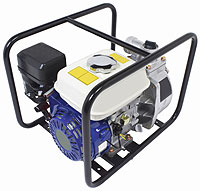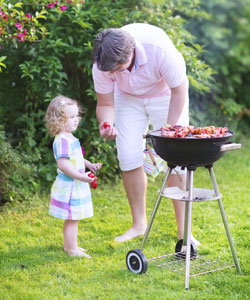Outdoor Fire Safety
Outdoor Fire Safety
Learn more about outdoor fire safety via the list below.
BBQ and Propane Safety
Propane Information and Storage
Propane is stored as a liquid, but used as a vapour. The cylinder must be stored outdoors and kept upright at all times to prevent leakage.
Propane, in its natural state, is a colourless odourless gas and is odorized at the refinery. The ethyl mercaptan which is added gives the propane a very strong boiling cabbage/burnt garlic smell which is detectable long before concentrations become dangerous.
An important thing to remember is that propane vapour is heavier than air and therefore, if a leak should occur, the invisible vapour will "pool" in low-lying areas. This is one of the main reasons that it is imperative that propane cylinders and tanks be used and stored outdoors only. Clause 9.5.1.2 of the Propane Installation Code (a national standard of Canada) states that "A cylinder which contains propane liquid, or vapour, shall not be stored or used inside any structure". Remember that a cylinder which seems empty is still full of propane vapour and still presents a hazard if it should leak.
Propane & Natural Gas Barbecue Maintenance
Make sure the burner holes and tubes connected to the burners are rust and debris free and that the burner throat, where the propane enters the burner, is free of dust or cobwebs.
All hoses and joints should be soap tested by using a solution of dish soap and water. Leave the barbecue valve off and the cylinder valve on. Spread the soapy solution generously on all fittings and the hose. If bubbles appear and become larger or increase in number, then you have a leak. Never check for leaks with an open flame. If you're not sure about something, take it back to the dealer for help or call a qualified propane technician.
The fitting that connects the barbecue hose to the cylinder has a left hand thread. Turn it counter-clockwise to tighten. If the fitting has an 'O' ring, check it every time you connect the cylinder. It should be replaced if it's bent or worn.
Use of Propane Barbecues
- Always use gas grills outdoors. Grilling in the garage with the door open does not allow for enough ventilation and could cause an accumulation of carbon monoxide.
- Only open your propane tank a quarter to one-half turn. That's all the gas your barbecue needs to operate, and if you have a problem, then it's much easier to shut off.
- When lighting your barbecue, have the match or lighter already burning with the barbecue lid open before you turn on the propane.
- Always keep loose clothing away from a hot barbecue. Use long-handled tongs and brushes while grilling. It puts you at a safer distance away from the heat and flames.
- Make sure that the barbecue is at least 10 feet (3 metres) from the house, or any other objects that could catch fire. Never move a lit barbeque.
- After each use, turn off the propane tank cylinder valve first, then the "ON/OFF" valve on the barbecue. This way, propane does not get trapped in the hose when the barbecue is not in use.
- From the time you light the barbecue, until you finish cooking, stay with your fire - never leave a lit barbecue unattended.
- Always follow the manufacturer's instructions for the safe maintenance and use of your barbecue.
- At the start of the season, make sure the burner ports are free of rust or dirt and that the burner orifice is clear of dust and cobwebs.
- Transport a propane cylinder safely by placing it in a secure, upright position with the safety valve on top. It is preferable to transport it on the floor of the passenger compartment. Make sure the windows of the vehicle are open.
- Never use or store propane barbecues indoors or in any enclosed space, including a garage.
Charcoal Barbecues
- Never use gasoline to get the coals going. Use only charcoal lighting fluid.
- Let the lighter fluid soak into the coals for a minute or so before lighting it. That gives the explosive vapours a chance to dissipate. Before you light the coals, make sure that you put the lighter fluid at a safe distance away from the fire.
- Stand back from the coals when you ignite them, and make sure you didn't accidentally spill any fluid on yourself, or on any area surrounding the grill. If the coals start to die out on you, don't spray lighter fluid on the hot coals. You could end up with explosive results.
- Always extinguish the coals when you're finished barbecuing. While wearing oven mitts, take the coals out of the barbecue with tongs, and submerge them in a metal pail of water.
- Always ensure you keep your children and pets away from barbecues and flames.
Outdoor Fire/Campfire Safety
Firework Safety Tips
Setting of Consumer Fireworks is not permitted under By-Law Number 2004-52 A By-Law To Regulate Noise at anytime except:
-
Between dusk and 2300 hours (11:00 pm) on Victoria Day;
-
Between dusk and 2300 hours (11:00 pm) on the day immediately preceding Victoria Day;
-
Between dusk and 2300 hours (11:00 pm) on Canada Day;
-
Between dusk and 2300 hours (11:00 pm) on the day immediately preceding Canada Day;
-
Between dusk on New Year’s Eve and 0030 hours (12:30 am) on New Year’s Day; or,
-
When authorized by the Chief Fire Official.
(By-law Number 2004-52; 2017-68)
If you plan to celebrate a special occasion during one of the times permitted above with your own family fireworks show, please read the following tips from Kingston Fire & Rescue to help keep your celebration safe.
Family fireworks should only be used in clear areas away from other structures and dry vegetation. Pay close attention to these safety guidelines.
Some fireworks safety precautions to follow are:
- Purchase your fireworks from a reliable source.
- Always read and follow the label directions.
- Check the wind. Place fireworks in a bucket of sand and incline fireworks to go away from spectators (postpone fireworks if wind is strong).
- Keep fireworks in a closed box. Remove them one at a time and close the lid.
- Keep everyone at least 25ft away from the fireworks firing line.
- Keep all pets safely indoors.
- Persons using fireworks must be at least 18 years old.
- Use outdoors only.
- Always have water handy (a garden hose or bucket).
- Never set off fireworks during an open air burning ban.
- Never experiment or make your own fireworks.
- Never take fireworks apart or modify them in any way
- Light only one firework at a time. Wear eye protection and gloves while lighting fireworks.
- Light fireworks at arms length, then immediately stand back.
- Never lean over fireworks or attempt to pick up a "dud" for at least 30 minutes (Never re-light a "dud" firework).
- Never give sparklers to children. Sparklers have been considered to be harmless fun however; they burn extremely hot and can ignite clothing, and result in severe burns and/or eye injuries. The sparkler wire remains very hot after burnout and should be soaked in a bucket of water before discarding.
- Dispose of fireworks properly by soaking them in water and then disposing of them in your trashcan.
- Always put discarded sparklers into a bucket of water.
- Never throw or point fireworks at other people.
- Never carry fireworks in your pocket.
- Never hold a lit firework in your hand.
- Never shoot fireworks in metal or glass containers.
- Stay away from illegal explosives. "Firecrackers" are unsafe and illegal.
Gasoline Safety Tips
Handling Gasoline
- Like propane, gasoline is a common fuel used around the home and the cottage. Gasoline powers our lawnmowers, chainsaws, weed trimmers, outboard motors, ATV's, and more. Just like propane, gasoline must be handled properly to minimize the risk of incidents and maximize the benefits it provides.
- Always shut off the vehicle's engine and wait for lawnmowers, chain saws, or any machinery to cool before refuelling them.
- When filling containers or machinery, be at least three metres away from ignition sources and do not smoke.
- Never use gasoline as a solvent or cleaner.
- Never use gasoline to start a fire or pour it on a fire that is already lit. The fire can rush back up the stream and ignite the container in your hand.
- Never try to extinguish a gasoline fire with water - it will only spread the fire. Use a fire extinguisher to extinguish the fire.
- Never use gasoline indoors.
- Never pour gasoline on the ground, in a sewer or drain, or into a lake or river. Not only does it contaminate the environment, it may cause a fire or explosion.
- Unwanted gasoline must be taken to a hazardous waste disposal centre.
Gasoline Storage
- Always store gasoline in approved containers or tanks.
- Never store gasoline in glass or unapproved containers.
- Never store gasoline in your home or cottage - keep it in a detached garage or shed and away from heat sources.
- Never leave a container of gasoline in direct sunlight or in the trunk of a car.
- Fill containers no more than 95% full to allow for expansion.
- Tighten both the fill cap and the vent cap on the container after filling.
Portable Generator Safety
Many people have purchased portable generators as a back-up power source. While these appliances can provide alternative energy during power outages, portable generators can create electrical hazards and carbon monoxide in the home if not properly installed, operated, and maintained.
- Purchase generators with recognized approval labels such as ULC or CSA, etc..
- Hire a knowledgeable and licensed contractor to install the unit. Purchase approved transfer devices if the generator is to be hooked up to the household electrical system and ensure proper connection receptacles and circuit breakers are utilized.
- Standby generator installations should be inspected by the Electrical Safety Authority prior to use. Electrical Safety Authority
- Make sure that the generators are installed and used as per the manufacturer's instructions.
- Portable generators should only be used outdoors and carefully located to ensure that the exhaust fumes do not enter the home.
- In addition to smoke alarms, consider installing carbon monoxide alarms on every storey of the home to provide additional protection.
- Allow the generator to cool before refuelling. Refuel the generator outside, following the manufacturer's instructions.
- Store fuel for the generator in approved containers outside the home.

